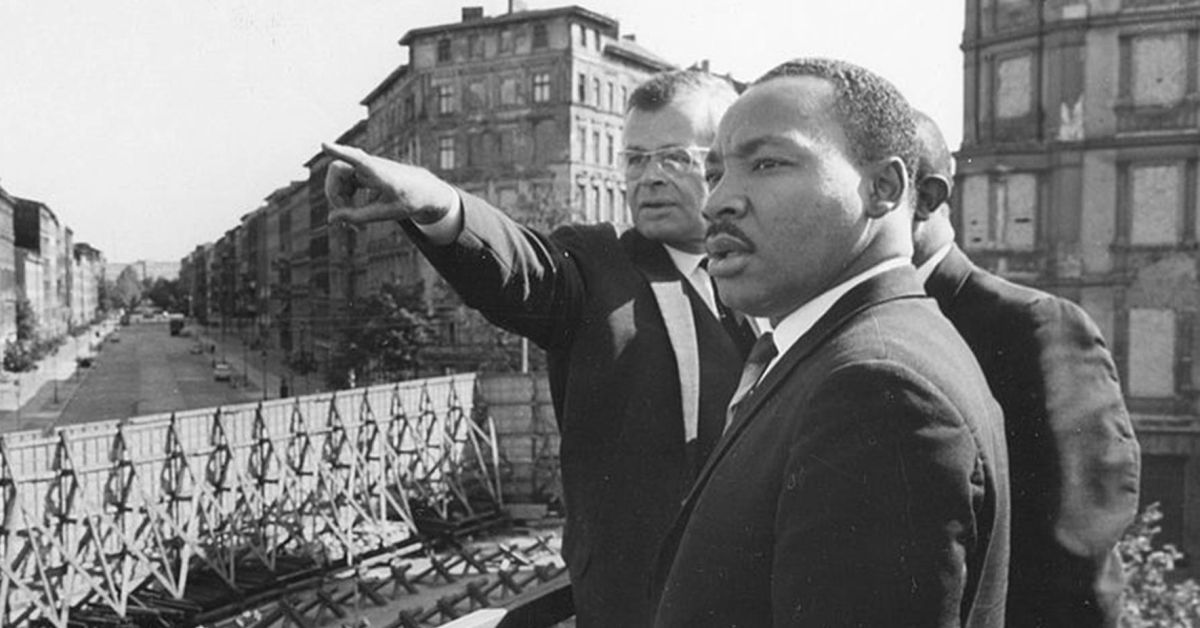German Department Highlights MLK’s Visit to Divided Berlin
During the week of February 18, 2020, The Department of German is participating in Georgetown’s MLK Initiative with a department-wide celebration of an often-overlooked trip Dr. Martin Luther King Jr. took to Berlin on September 13, 1964.
MLK in Berlin
Already an internationally famous figure by 1964, King visited West Berlin on the invitation of Social Democratic leader Willy Brandt. He attended a memorial service for John F. Kennedy and spoke before a crowd of 20,000 where he called the newly constructed Berlin Wall “a symbol of the divisions of mankind on the face of the Earth.”
The same day King visited Western Germany, a man named Michael Meyer attempted an unauthorized escape from the Eastern side. He made it to the Western side of the city but was shot by East German guards soon after crossing, sustaining serious injuries. After his speech, King requested to visit the spot where Meyer was shot.
King also received an invitation from East German pastor Heinrich Grüber to deliver an address at a church in East Berlin. Though his State Department detail withheld his passport due to concerns that this trip to Soviet territory would spark an international incident, King crossed anyway using an American Express card as identification.
King only remained in East Berlin for a few hours that night. Responding to concerns raised by church organizers of a possible state crackdown as a result of the large crowds King tended to draw, he delivered the same speech in two separate venues.
“We are all God’s children, and no man-made barrier can obliterate that fact,” King said in reference to the division of Berlin.
Class Presentations
During the week of February 19, 2020, each German class will spend 15 to 20 minutes discussing King’s visit during this week. Professor Astrid Weigert and Ph.D. candidate Andrea Bryant have prepared a presentation that contains details from King’s speeches, articles and multimedia materials available to all German professors and their students.
Bryant, whose research focuses on diverse perspectives in German, enjoyed bringing a rich variety of materials on King’s visit to Georgetown.
“You could probably do an entire semester on this visit,” Bryant said. “There’s art and literature on this in German, it’s been performed on stage.”
This part of the history of the Berlin Wall is often forgotten, but these materials provide students with a unique lens to examine an important section of Germany’s past.
“Everyone teaches about the Berlin Wall. This isn’t in it.” Weigert said.
Professors will use their own discretion on which materials to utilize based on the course level they’re teaching, and the presentations all offer additional resources for students looking to learn more. Bryant expects it will be a valuable learning opportunity for students at all levels each year.
“We have some documents in English and some in German, so depending on the level and instructor, there are options on how to teach it,” Weigert said. “But the main thing is that there’s a commitment from the entire department. This is our contribution.”
A Unique Contribution
Weigert is excited that the German department has found a special way to participate in Georgetown’s MLK Initiative, a cross-campus celebration of the life and legacy of Dr. Martin Luther King Jr.
“I was always intrigued by the annual university-wide “Teach-the-Speech” initiative, but couldn’t quite figure out how we, in the Department of German, could contribute. Somewhere in the back of my mind, I remembered reading that Dr. King had spent time in Germany,” Weigert said. “I looked it up, and it turned out that he had indeed visited both East and West Berlin shortly after the Berlin Wall had been built. Teaching about this visit, then, became our unique angle to celebrate the legacy of Dr. Martin Luther King, Jr.”
Students reacted very positively to the initial “Teach-the-Visit” class component last year. Plans are to repeat the “Teach-the-Visit” class project each year in February for the foreseeable future.
In addition, the Department plans to share the multimedia presentation compiled on Dr. King’s visit to Berlin with colleagues at other universities.
- Tagged
- German
- MLK Initiative
